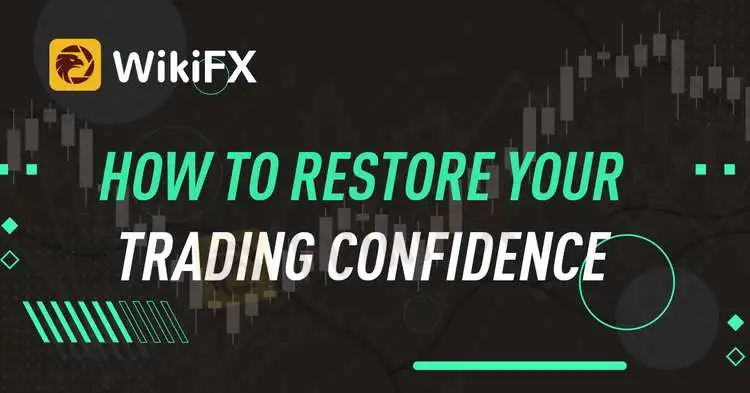简体中文
繁體中文
English
Pусский
日本語
ภาษาไทย
Tiếng Việt
Bahasa Indonesia
Español
हिन्दी
Filippiiniläinen
Français
Deutsch
Português
Türkçe
한국어
العربية
HOW TO RESTORE YOUR TRADING CONFIDENCE
Abstract:Confidence is the most important aspect of trading, it is necessary for every trader to have that irrespective of the loss incurred on any transaction made. Following a significant loss, one's confidence may be shaken. Of course, there are several reasons why traders lose money, including a lack of market understanding, a bad risk management approach, or making trading decisions based on emotions, whether greed or fear. However, when a trader loses confidence, it may have a significant impact on their trading success. So, how can you keep your confidence up even when you're on a losing streak?

If the markets have shaken your confidence, here are three easy measures you can do right away to re-establish your trading confidence and get back on track.
Accept Accountability for Your Trades
However, when things go wrong, you must accept responsibility and try to determine what may have been done better to avoid such a loss. Consider where you went short. For example, did you take too many chances? Was the transaction carried out as planned? Or did you allow your emotions control your business?
It's also a good idea to halt trading until you figure out what went wrong. Learning from failed trades is one of the most effective strategies to enhance your overall trading performance. Remember, if you don't have control over your trade, you can repair it. When you accept responsibility, you have control over your trade, which is precisely what you desire.
Concentrate on a Sound Trading Strategy
Get back to fundamentals if you've suffered a significant loss. Concentrate on your trading strategy (including any adjustments) and its implementation. A sound trading strategy distinguishes successful traders from others. Before returning to trading after a loss, you should have a complete trading strategy in place that takes into account your trading style and risk tolerance levels.
Your approach must also incorporate effective risk management strategies. After all, without an appropriate risk management approach, a trader who has made profits might lose it all in only one or two poor trades.
Losses should not be taken personally.
Losses are unavoidable in trading. A successful trader is one who can remain calm in the face of a loss. By maintaining energy and resilience, you may avoid taking losses personally and so become a better trader.
However, if your trade lacks drive, you will be upset after a loss. As a result, your ability to make sound and objective trading decisions suffers, and you must either take vengeance trades or leave. Analyzing the results, evaluating the trade setup, and identifying what went wrong is a great way to deal with losses.
In conclusion
When your trading strategy is strong, well-thought-out, and aligned with your goals and risk tolerance levels, you will feel fairly confident and safe in your trade. Also, keep in mind! Losing money is not the end of the world. To be successful in trading, you must be willing to accept the risk of accepting any risk that comes your way

Disclaimer:
The views in this article only represent the author's personal views, and do not constitute investment advice on this platform. This platform does not guarantee the accuracy, completeness and timeliness of the information in the article, and will not be liable for any loss caused by the use of or reliance on the information in the article.
Read more

Think You’re Too Smart to Fall for an Investment Scam?!
Investment scams are no longer the domain of obvious fraudsters and badly written emails. Today’s scams are polished, convincing, and alarmingly professional. They mimic the language and appearance of legitimate investment firms, targeting everyone from novice investors to seasoned professionals. A single mistake could wipe out years of savings. But by learning to spot the red flags early, you can protect yourself and your finances from these increasingly deceptive traps.

Should You Beware of Forex Trading Gurus?
Know the reality behind forex trading gurus, examining their deceptive tactics, inflated promises, and the risks associated with trusting them for financial advice.

Forex Explained in 60 Seconds: How It Works & Who Profits
Before diving into the forex market, it’s crucial to understand its mechanics, risks, and profit potential. Without a clear grasp of how forex operates, you risk losing money instead of making it. Here’s a concise breakdown to help you navigate this dynamic financial market.

Check Yourself: Are You Always Rushing for Trades?!
With market fluctuations happening in real-time and profits hinging on split-second decisions, many traders develop an impulse to act quickly. But have you ever stopped to ask yourself: Am I rushing into trades? If you’re constantly clicking “Buy” or “Sell” in a flurry of excitement or anxiety, you may be falling into a dangerous trap that could cost you more than you realise.
WikiFX Broker
Latest News
eXch Exchange to Shut Down on May 1 Following Laundering Allegations
How a Viral TikTok Scam Cost a Retiree Over RM300,000
JT Capital Markets Review
FCA Proposes Simplifying Investment Cost Disclosure for Retail Investors
Fresh Look, Same Trust – INGOT Brokers Rebrands its Website
FCA Issues Alerts Against Unauthorised and Clone Firms in the UK
Consob Orders Blackout of 9 Fraudulent Financial Websites
Tradu Joins TradingView for Seamless CFD and Forex Trading
Japan Issues Urgent Warning on $700M Unauthorized Trades
Silver surges past $33—are you ready for what comes next?
Currency Calculator


